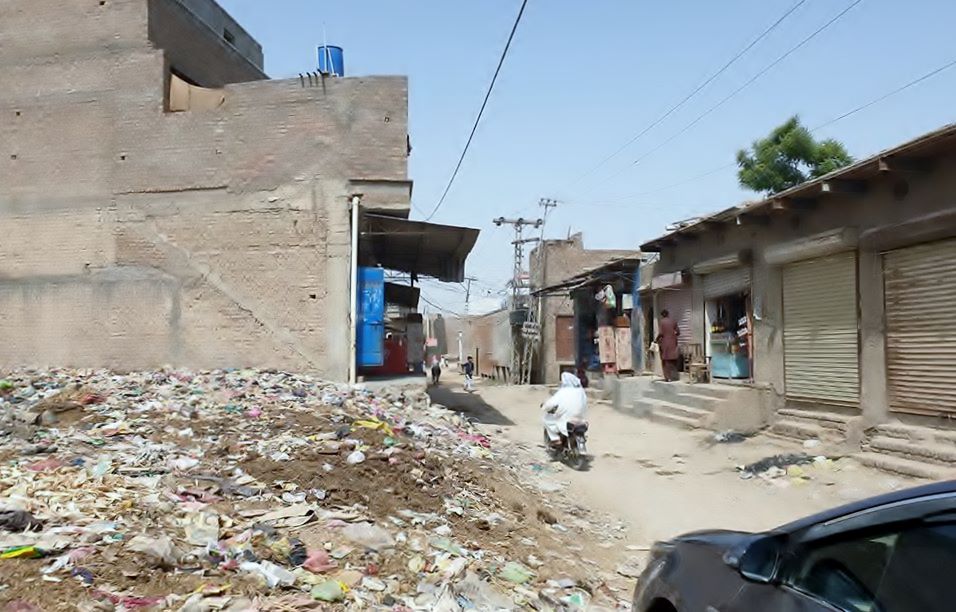5月の下旬から日本国内でもニュースで報じられていますが、パキスタンの地方の街で4月にHIV感染のアウトブレークが確認され、わずか6週間余りの間に検査で750人以上の感染が判明しています。その大半は子供だということです。
国連機関とパキスタン政府、地元を州政府が対応に乗り出し、検査を進めるとともに、原因の調査や感染した人たちへの抗レトロウイルス治療の提供など中長期の対策にも取り組んでいます。
国連合同エイズ計画(UNAIDS)の公式サイトに6月11日付で掲載されている報告(Feature Story)によると『アウトブレークの原因を解明するために、調査はさらに続けられているが、専門家は、注射や点滴の器具を消毒せず再使用していたことを含め、感染制御策の不備がその要因だと推定している』ということです。
パキスタンでは医療体制の不備から無資格の偽医者がもぐりで治療にあたることも多く、今回のアウトブレークに対する緊急の対策をとる中で『シンド州保健局は無資格の医師による治療をやめさせるための監視を強化し、その結果として900カ所のクリニックと無資格血液銀行が閉鎖されている』とUNAIDSは報告しています。
以下、Feature Storyの日本語仮訳です。

ラルカナのHIVアウトブレークへの対応
2019年6月11日 UNAIDS Feature Story
https://www.unaids.org/en/resources/presscentre/featurestories/2019/june/20190611_larnaka_outbreak
アーメド(仮名)は不安な表情で話す:5歳の息子ムフタルがHIV感染の診断を受けた。彼はパキスタン南東部のロタデロ市にある病院の医療従事者で、シンド州で子供のHIV感染が増加しているという地元メディアの警告報道を受けて、ムフタルにHIV検査を受けさせた。
多数の子供の患者が短期間にHIV検査で陽性となっていることがロタデロの医師から報告され、パキスタン保健当局は4月の終わりにラルカナ地区でHIVスクリーニング検査を拡大した。その結果、6週間余りの間に750人以上がHIV感染の診断を受け、アーメドの息子も含めた確認症例の80%は子供だった。このアウトブレーク以前の段階で、パキスタン全体の子供のHIV陽性者数は1000人を少し超える程度だった。アウトブレークの原因を解明するために、調査はさらに続けられているが、専門家は、注射や点滴の器具を消毒せず再使用していたことを含め、感染制御策の不備がその要因だと推定している。
アーメドが話をしている間、ムフタルは父親の膝の上で静かに座っていた。
「妻に話したら、いろいろ聞かれました。どこから感染したの、どうしてこの子が感染しなければいけないの、この子は生きていけるの」。アーメド一家は不安と恐怖でいっぱいになった。その不安と恐怖は州全体にも広がっている。スクリーニング検査のサイトには毎日、何百人もの子供の親が列を作り、病院やクリニックにも子供に検査を受けさせるために集まっている。HIVに対する知識はほとんどない人が多い。
アウトブレークに即応するため、シンド州エイズ対策プログラム(SACP)は、HIV検査ハブを拡大し、ロタデロのタルカ中央病院に新たな検査施設を開設するなど、検査キャンペーンを展開している。こうした対策により2万6000人以上が検査を受け、そのほとんどが子供だった。シンド州保健局は無資格の医師による治療をやめさせるための監視を強化し、その結果として900カ所のクリニックと無資格血液銀行が閉鎖されている。
感染が分かったらHIV治療を直ちに受けられるようにするため、子供向けの新たな抗レトロウイルス治療のクリニックがラルカナに開設され、医療従事者も追加派遣されている。こうした対策が命を救うことになる。アーメドの息子を含む356人がすでにHIVケアサービスを受け、抗レトロウイルス治療を開始している。「怖かった。でも、息子は必要な治療を受けています」とアーメドはいう。「いま必要なのは、この地区でARV治療が確実に続けられるようにすることです」
パキスタンの国連機関は、現場で技術支援を提供し、地元のパートナーがHIVのアウトブレークに効果的に対応して危機の影響を軽減するために、連邦政府および州政府と緊密に連絡をとって対応している。世界保健機関(WHO)、国連児童基金(UNICEF)、UNAIDS、国連人口基金(UNFPA)、その他の国連機関の全面的参加により、国連は「シンドHIVアウトブレーク対応計画2019年5月-2020年4月」の遂行を支援している。計画にはHIVアウトブレークの原因を解明し、対応策を打ち出し、HIV予防、治療、ケア、支援のサービスを切れ目なく提供していくための短期、長期の段階的な対応策が含まれている。
SACPとUNAIDSの支援を受けた国家機関などからなるチームが一義的に責任を負う役割を担っている。さらに連邦政府の要請に応じて発生源とHIV感染の規模、連鎖を調べる疫学的調査を実施し、勧告を行うために国際社会の支援と専門的能力が提供される。調査はアガ・カーン大学(AKU)、パキスタン現地疫学調査・臨床検査研修プログラム(FELTP)、UNAIDS、UNICEF、カラチのダウ医科大学、パキスタン感染症微生物学会の支援のもとで、WHOが主導して進められ、予備的な調査の結果については6月14日に明らかにされる予定だ。
国連は同時に、パキスタン国内でスティグマと差別が広がることを防ぎ、保健教育を促進するためのコミュニティプランの策定を進め、すべてのレベルでコミュニティが関与できるようにするための国内パートナーの支援も行っている。SACPは保健医療従事者に対し小児患者のケースマネージメントと啓発のための研修を行う。また、コミュニティ組織や宗教指導者も加わる保健教育会議が組織される予定だ。責任あるHIV報道のために、地元メディアを対象にした研修も実施されることになる。「このアウトブレークの根にあるものは何かを突き止め、それに対応し、こうした悲劇が再び起きないようにしなければなりません」とアーメドはいう。
パキスタンでは、2017年の新規HIV感染が2万件に達し、アジア太平洋地域では2番目にエイズの流行が拡大している国となっている。社会的に弱い立場に置かれ、排除されがちな人口集団、とりわけキーポピュレーションが流行から極端に大きな影響を受けている。UNAIDSは対応の強化を引き続き支援していく。
「誰も取り残すことなくパキスタンのエイズ終結を目指していくには、国内および国際パートナーと協力して、HIV新規感染予防における大きなギャップを解消し、すべてのHIV陽性者の健康と福祉が保障できるような対策に取り組まなければなりません」とUNAIDSパキスタン事務所のマリア・エレナ・F・ボロメオ所長は語っている。
Feature story
Responding to the HIV outbreak in Larkana
11 June 2019
Ahmed (not his real name) is worried as he tells his story: his five-year old son Mukhtar has been newly diagnosed with HIV. Ahmed, a medical officer working in a local hospital in the city of Rotadero in southeast Pakistan, had taken Mukhtar to be tested for HIV when the local media began warning of an increase in HIV cases among children living in his area of Sindh Province.
At the end of April, following warnings from a medical practitioner in Ratodero that a number of children under his care had tested positive for HIV in a short span of time, health officials expanded HIV screening in Larkana District. After more than six weeks of testing, more than 750 people have been newly diagnosed with HIV, with children accounting for 80% of the confirmed cases. Amhed’s son is one of them. Before the outbreak, just over 1000 children were living with HIV in the entire country. Although further investigations are being conducted to uncover the cause of the outbreak, experts say that poor infection control practices including a lack of sterilization and the re-use of syringes and drips, could be a factor.
Mukhtar sits quietly in his father’s lap, as Ahmed continues to tell his story.
“When I told my wife, she started to ask me questions, where did this come from, why has this happened to my child and will my child survive.” Anxiety and fear have grown in Ahmed’s family and across the province. Every day, hundreds of parents line up outside the screening sites and pour into hospitals and clinics to get their children tested. Many of them have little understanding of HIV.
As an immediate response to the outbreak, the Sindh AIDS Control Programme (SACP) has been carrying out a major testing campaign by expanding HIV testing hubs and establishing a new HIV testing facility at the Taluka Headquarter Hospital in Rotadero. These measures have enabled more than 26 000 people to be tested, mostly children. Sindh’s Ministry of Health has also strengthened its efforts to prevent unlicensed and informal medical practices from operating and, as a result, 900 health clinics and unlicensed blood banks have been closed.
To ensure immediate access to HIV treatment, a new antiretroviral treatment clinic for children has been established in Larkana and additional health care providers have been deployed. These efforts are saving lives, as 356 people, including Ahmed’s son, have already been enrolled in HIV care services and started antiretroviral therapy. “I was scared but then my child got the treatment he needed,” says Ahmed. “Now we need to ensure that ARV treatment will continue to be available in our district”.
The United Nations in Pakistan is working closely with the federal and provincial governments to provide on-site technical support to help local partners effectively respond to the HIV outbreak and reduce the impact of the crisis. With the full participation of the World Health Organization, UNICEF, UNAIDS, UNFPA and other UN agencies, the United Nations is providing support for the implementation of the “Sindh HIV Outbreak Response Plan, May 2019-Apr 2020”, which includes short-term and long-term steps to identify the causes of the HIV outbreak, address them and strengthen the continuum of HIV prevention, treatment, care and support services.
A team comprised of SACP and other national partners with support from the United Nations acted as first responders. Subsequently, international support and expertise was brought in at the request of the federal government, to carry out an epidemiological investigation to understand the source, extent and chain of HIV transmission and provide recommendations. The investigation, whose preliminary findings will be presented on June 14, is led by the WHO with support from the Aga Khan University (AKU), the Field Epidemiology and Laboratory Training (FELTP) Programme, UNAIDS, UNICEF, the Dow Medical University in Karachi, Microbiology Society of Infectious Disease in Pakistan.
The United Nations is also supporting national partners to develop a community response plan which will engage communities at all levels to reduce prevailing stigma and discrimination and promote health education. SACP will train health workers on paediatric case management and awareness and health education sessions will be organized with the involvement of community led organizations and religious leaders. Training sessions for local media on responsible HIV reporting and coverage will also be carried out. “We need to make sure that the root causes of this outbreak are tackled to prevent such tragedies from happening again,” says Ahmed.
With 20 000 new HIV infections in 2017, Pakistan has the second fastest growing AIDS epidemic in the Asia Pacific region, with the virus disproportionately affecting the most vulnerable and marginalized, especially key populations. UNAIDS continues to advocate for a strengthened response to the epidemic.
“We need ongoing work with national and international stakeholders to effectively address the critical gaps in preventing new HIV infections and to guarantee the health and well-being of all people living with HIV in Pakistan, so that the country is not left behind in the effort to end AIDS,” says Maria Elena F. Borromeo, UNAIDS Country Director in Pakistan.